SBM1300 Research: Feasibility Analysis, Electric Vehicles in NSW
VerifiedAdded on 2022/08/18
|6
|1177
|9
Report
AI Summary
This report presents a feasibility analysis of electric vehicles (EVs) within the New South Wales (NSW) transportation management system, specifically focusing on Sydney. It examines the impact of EVs on logistics and supply chains, considering sustainability and cost-effectiveness. The analysis includes feedback from an industry representative, exploring the benefits and challenges of EV adoption, such as reduced fuel costs and environmental impact. The representative also discusses challenges like initial costs and infrastructure needs. The report reflects on the feedback, emphasizing the importance of the research in guiding strategic decisions related to EV integration and improving the efficiency of logistics activities. The study employs a questionnaire methodology to gather data and provides recommendations for the logistics and transportation industry to leverage the advantages of EVs in terms of cost savings, environmental benefits, and enhanced operational efficiency. The research highlights the significance of EVs in achieving sustainability goals and gaining a competitive edge in the transportation sector.
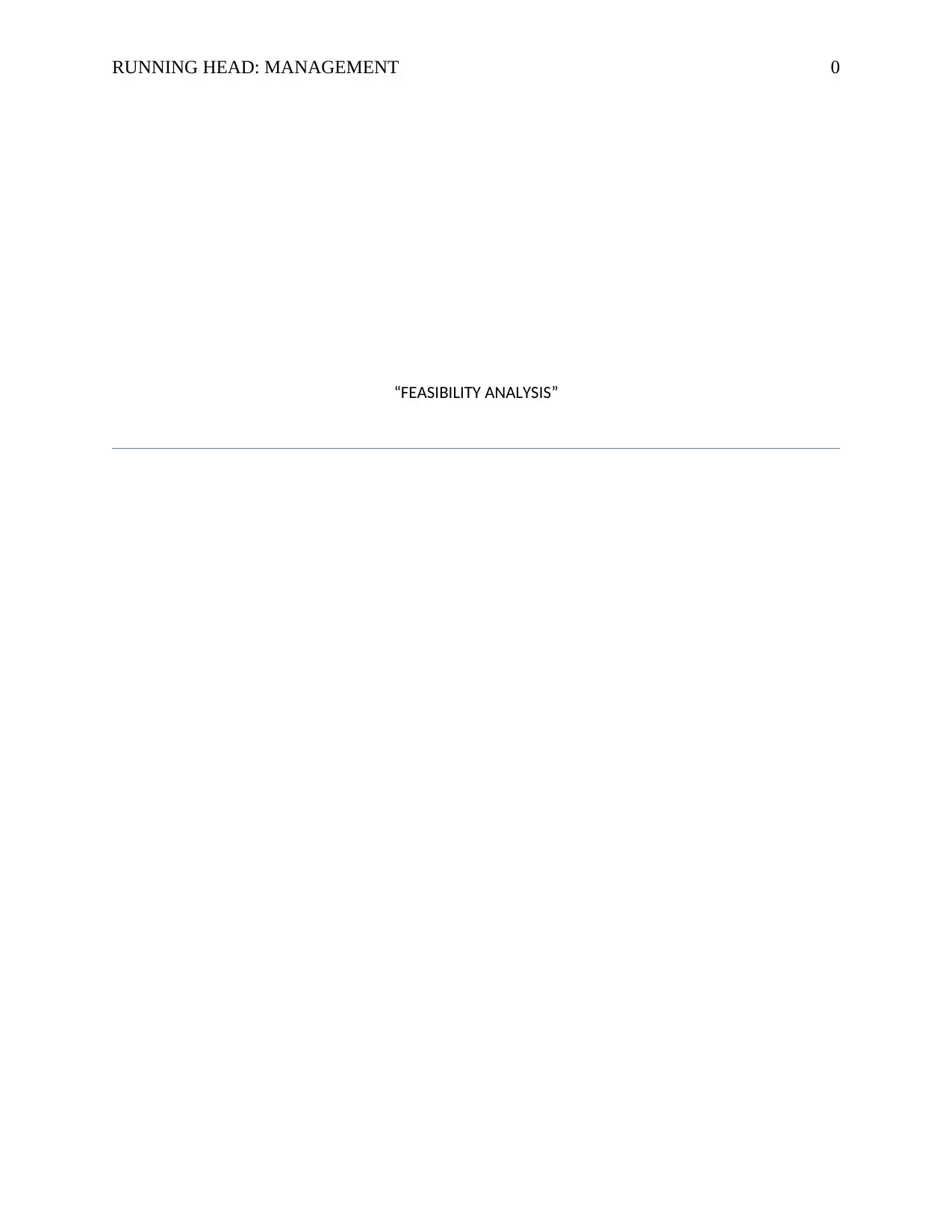
RUNNING HEAD: MANAGEMENT 0
“FEASIBILITY ANALYSIS”
“FEASIBILITY ANALYSIS”
Paraphrase This Document
Need a fresh take? Get an instant paraphrase of this document with our AI Paraphraser
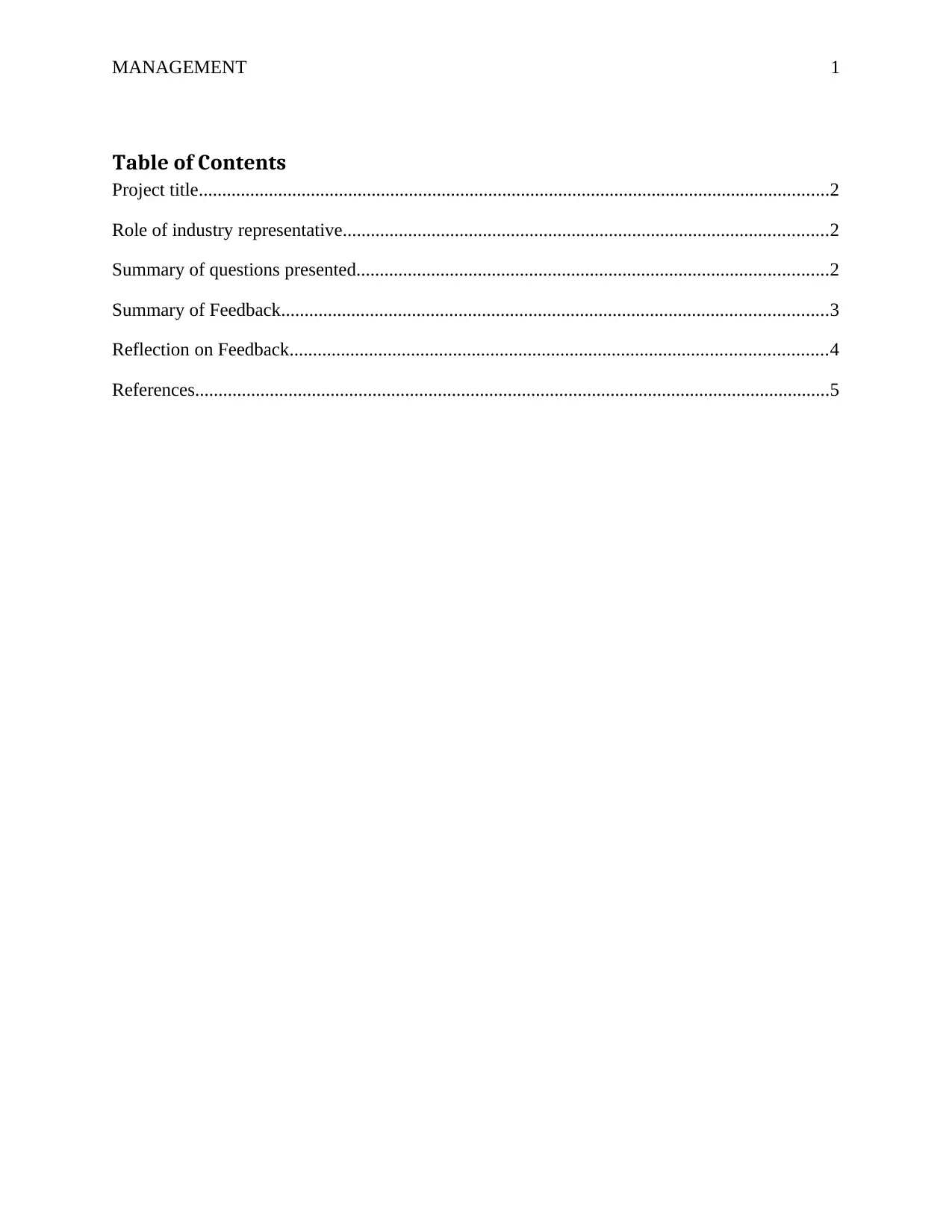
MANAGEMENT 1
Table of Contents
Project title.......................................................................................................................................2
Role of industry representative........................................................................................................2
Summary of questions presented.....................................................................................................2
Summary of Feedback.....................................................................................................................3
Reflection on Feedback...................................................................................................................4
References........................................................................................................................................5
Table of Contents
Project title.......................................................................................................................................2
Role of industry representative........................................................................................................2
Summary of questions presented.....................................................................................................2
Summary of Feedback.....................................................................................................................3
Reflection on Feedback...................................................................................................................4
References........................................................................................................................................5
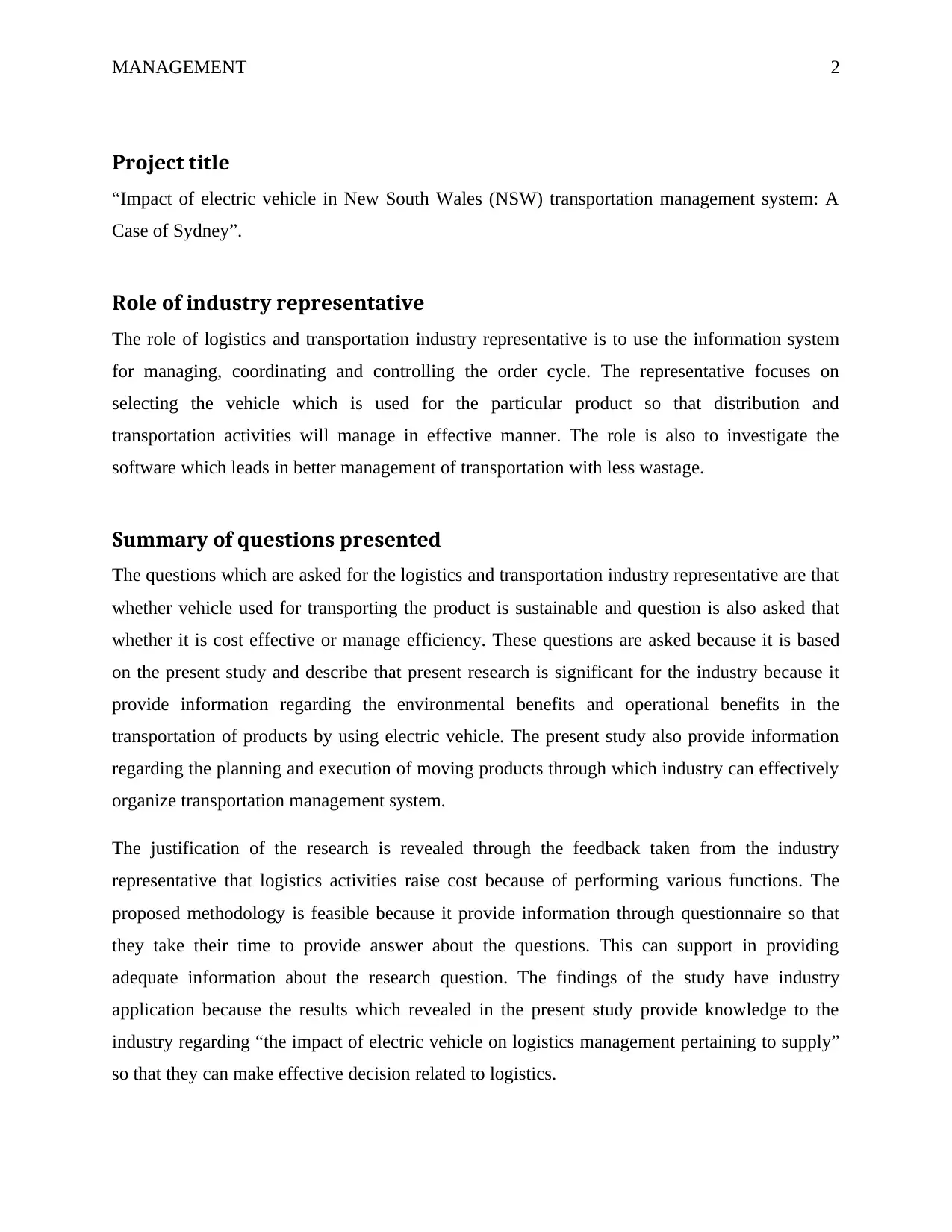
MANAGEMENT 2
Project title
“Impact of electric vehicle in New South Wales (NSW) transportation management system: A
Case of Sydney”.
Role of industry representative
The role of logistics and transportation industry representative is to use the information system
for managing, coordinating and controlling the order cycle. The representative focuses on
selecting the vehicle which is used for the particular product so that distribution and
transportation activities will manage in effective manner. The role is also to investigate the
software which leads in better management of transportation with less wastage.
Summary of questions presented
The questions which are asked for the logistics and transportation industry representative are that
whether vehicle used for transporting the product is sustainable and question is also asked that
whether it is cost effective or manage efficiency. These questions are asked because it is based
on the present study and describe that present research is significant for the industry because it
provide information regarding the environmental benefits and operational benefits in the
transportation of products by using electric vehicle. The present study also provide information
regarding the planning and execution of moving products through which industry can effectively
organize transportation management system.
The justification of the research is revealed through the feedback taken from the industry
representative that logistics activities raise cost because of performing various functions. The
proposed methodology is feasible because it provide information through questionnaire so that
they take their time to provide answer about the questions. This can support in providing
adequate information about the research question. The findings of the study have industry
application because the results which revealed in the present study provide knowledge to the
industry regarding “the impact of electric vehicle on logistics management pertaining to supply”
so that they can make effective decision related to logistics.
Project title
“Impact of electric vehicle in New South Wales (NSW) transportation management system: A
Case of Sydney”.
Role of industry representative
The role of logistics and transportation industry representative is to use the information system
for managing, coordinating and controlling the order cycle. The representative focuses on
selecting the vehicle which is used for the particular product so that distribution and
transportation activities will manage in effective manner. The role is also to investigate the
software which leads in better management of transportation with less wastage.
Summary of questions presented
The questions which are asked for the logistics and transportation industry representative are that
whether vehicle used for transporting the product is sustainable and question is also asked that
whether it is cost effective or manage efficiency. These questions are asked because it is based
on the present study and describe that present research is significant for the industry because it
provide information regarding the environmental benefits and operational benefits in the
transportation of products by using electric vehicle. The present study also provide information
regarding the planning and execution of moving products through which industry can effectively
organize transportation management system.
The justification of the research is revealed through the feedback taken from the industry
representative that logistics activities raise cost because of performing various functions. The
proposed methodology is feasible because it provide information through questionnaire so that
they take their time to provide answer about the questions. This can support in providing
adequate information about the research question. The findings of the study have industry
application because the results which revealed in the present study provide knowledge to the
industry regarding “the impact of electric vehicle on logistics management pertaining to supply”
so that they can make effective decision related to logistics.
⊘ This is a preview!⊘
Do you want full access?
Subscribe today to unlock all pages.

Trusted by 1+ million students worldwide
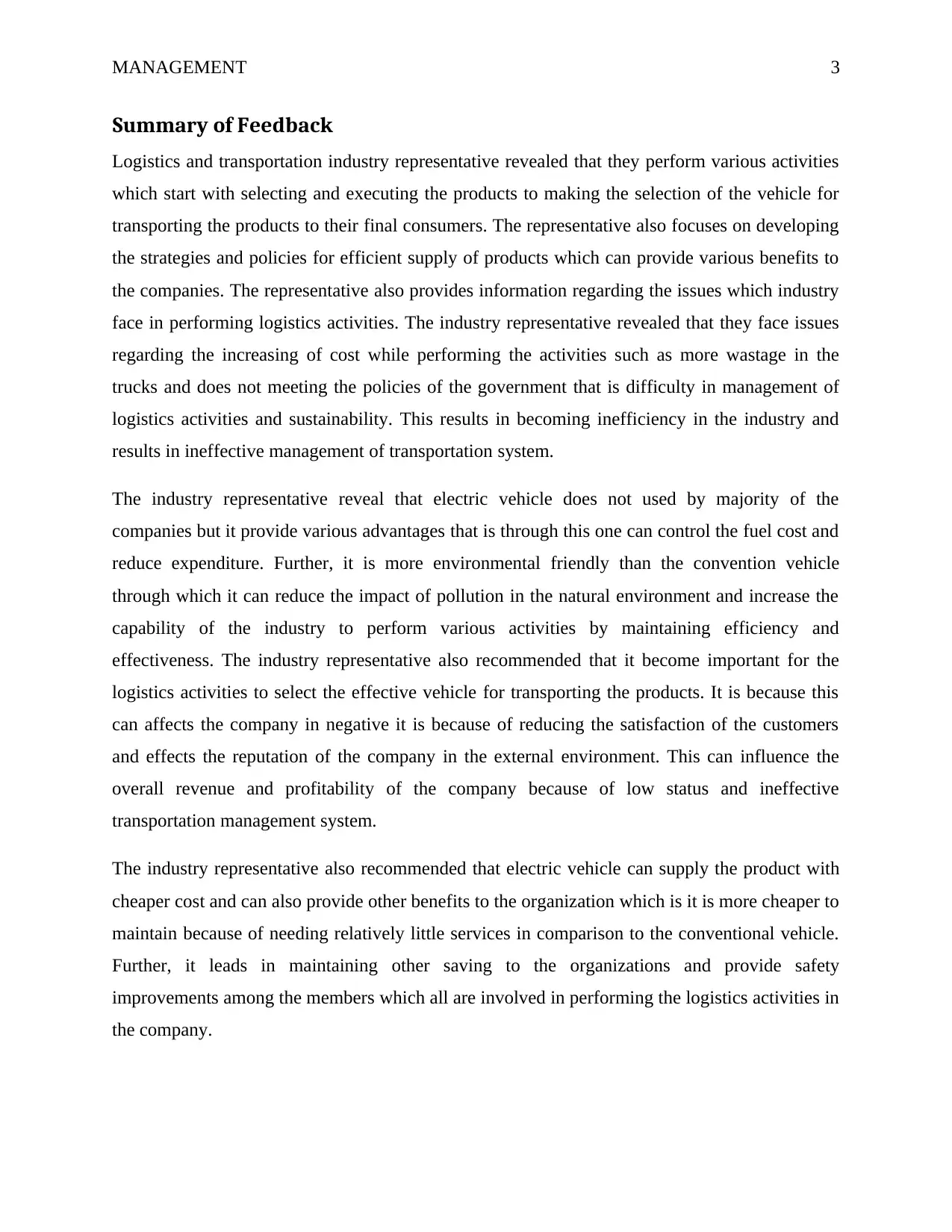
MANAGEMENT 3
Summary of Feedback
Logistics and transportation industry representative revealed that they perform various activities
which start with selecting and executing the products to making the selection of the vehicle for
transporting the products to their final consumers. The representative also focuses on developing
the strategies and policies for efficient supply of products which can provide various benefits to
the companies. The representative also provides information regarding the issues which industry
face in performing logistics activities. The industry representative revealed that they face issues
regarding the increasing of cost while performing the activities such as more wastage in the
trucks and does not meeting the policies of the government that is difficulty in management of
logistics activities and sustainability. This results in becoming inefficiency in the industry and
results in ineffective management of transportation system.
The industry representative reveal that electric vehicle does not used by majority of the
companies but it provide various advantages that is through this one can control the fuel cost and
reduce expenditure. Further, it is more environmental friendly than the convention vehicle
through which it can reduce the impact of pollution in the natural environment and increase the
capability of the industry to perform various activities by maintaining efficiency and
effectiveness. The industry representative also recommended that it become important for the
logistics activities to select the effective vehicle for transporting the products. It is because this
can affects the company in negative it is because of reducing the satisfaction of the customers
and effects the reputation of the company in the external environment. This can influence the
overall revenue and profitability of the company because of low status and ineffective
transportation management system.
The industry representative also recommended that electric vehicle can supply the product with
cheaper cost and can also provide other benefits to the organization which is it is more cheaper to
maintain because of needing relatively little services in comparison to the conventional vehicle.
Further, it leads in maintaining other saving to the organizations and provide safety
improvements among the members which all are involved in performing the logistics activities in
the company.
Summary of Feedback
Logistics and transportation industry representative revealed that they perform various activities
which start with selecting and executing the products to making the selection of the vehicle for
transporting the products to their final consumers. The representative also focuses on developing
the strategies and policies for efficient supply of products which can provide various benefits to
the companies. The representative also provides information regarding the issues which industry
face in performing logistics activities. The industry representative revealed that they face issues
regarding the increasing of cost while performing the activities such as more wastage in the
trucks and does not meeting the policies of the government that is difficulty in management of
logistics activities and sustainability. This results in becoming inefficiency in the industry and
results in ineffective management of transportation system.
The industry representative reveal that electric vehicle does not used by majority of the
companies but it provide various advantages that is through this one can control the fuel cost and
reduce expenditure. Further, it is more environmental friendly than the convention vehicle
through which it can reduce the impact of pollution in the natural environment and increase the
capability of the industry to perform various activities by maintaining efficiency and
effectiveness. The industry representative also recommended that it become important for the
logistics activities to select the effective vehicle for transporting the products. It is because this
can affects the company in negative it is because of reducing the satisfaction of the customers
and effects the reputation of the company in the external environment. This can influence the
overall revenue and profitability of the company because of low status and ineffective
transportation management system.
The industry representative also recommended that electric vehicle can supply the product with
cheaper cost and can also provide other benefits to the organization which is it is more cheaper to
maintain because of needing relatively little services in comparison to the conventional vehicle.
Further, it leads in maintaining other saving to the organizations and provide safety
improvements among the members which all are involved in performing the logistics activities in
the company.
Paraphrase This Document
Need a fresh take? Get an instant paraphrase of this document with our AI Paraphraser
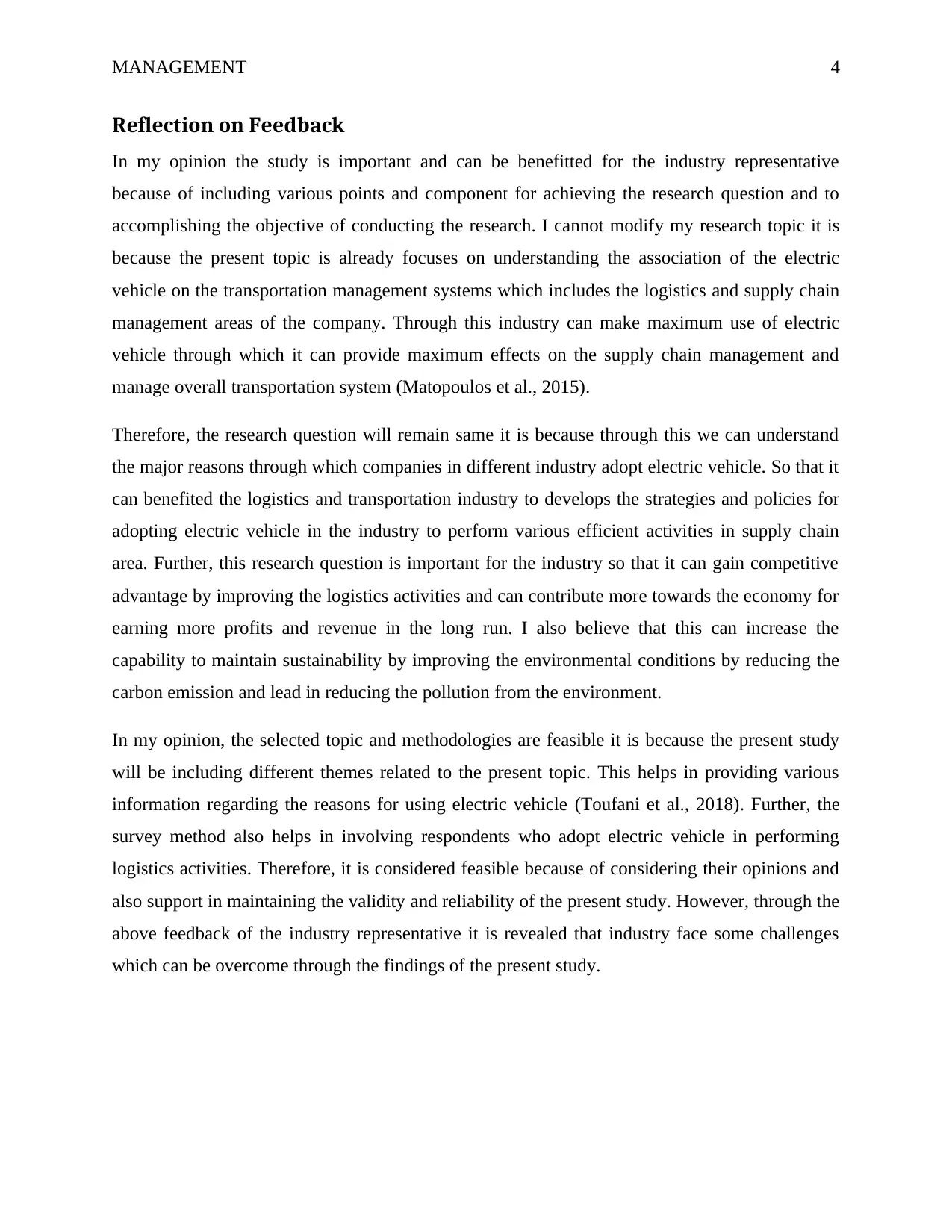
MANAGEMENT 4
Reflection on Feedback
In my opinion the study is important and can be benefitted for the industry representative
because of including various points and component for achieving the research question and to
accomplishing the objective of conducting the research. I cannot modify my research topic it is
because the present topic is already focuses on understanding the association of the electric
vehicle on the transportation management systems which includes the logistics and supply chain
management areas of the company. Through this industry can make maximum use of electric
vehicle through which it can provide maximum effects on the supply chain management and
manage overall transportation system (Matopoulos et al., 2015).
Therefore, the research question will remain same it is because through this we can understand
the major reasons through which companies in different industry adopt electric vehicle. So that it
can benefited the logistics and transportation industry to develops the strategies and policies for
adopting electric vehicle in the industry to perform various efficient activities in supply chain
area. Further, this research question is important for the industry so that it can gain competitive
advantage by improving the logistics activities and can contribute more towards the economy for
earning more profits and revenue in the long run. I also believe that this can increase the
capability to maintain sustainability by improving the environmental conditions by reducing the
carbon emission and lead in reducing the pollution from the environment.
In my opinion, the selected topic and methodologies are feasible it is because the present study
will be including different themes related to the present topic. This helps in providing various
information regarding the reasons for using electric vehicle (Toufani et al., 2018). Further, the
survey method also helps in involving respondents who adopt electric vehicle in performing
logistics activities. Therefore, it is considered feasible because of considering their opinions and
also support in maintaining the validity and reliability of the present study. However, through the
above feedback of the industry representative it is revealed that industry face some challenges
which can be overcome through the findings of the present study.
Reflection on Feedback
In my opinion the study is important and can be benefitted for the industry representative
because of including various points and component for achieving the research question and to
accomplishing the objective of conducting the research. I cannot modify my research topic it is
because the present topic is already focuses on understanding the association of the electric
vehicle on the transportation management systems which includes the logistics and supply chain
management areas of the company. Through this industry can make maximum use of electric
vehicle through which it can provide maximum effects on the supply chain management and
manage overall transportation system (Matopoulos et al., 2015).
Therefore, the research question will remain same it is because through this we can understand
the major reasons through which companies in different industry adopt electric vehicle. So that it
can benefited the logistics and transportation industry to develops the strategies and policies for
adopting electric vehicle in the industry to perform various efficient activities in supply chain
area. Further, this research question is important for the industry so that it can gain competitive
advantage by improving the logistics activities and can contribute more towards the economy for
earning more profits and revenue in the long run. I also believe that this can increase the
capability to maintain sustainability by improving the environmental conditions by reducing the
carbon emission and lead in reducing the pollution from the environment.
In my opinion, the selected topic and methodologies are feasible it is because the present study
will be including different themes related to the present topic. This helps in providing various
information regarding the reasons for using electric vehicle (Toufani et al., 2018). Further, the
survey method also helps in involving respondents who adopt electric vehicle in performing
logistics activities. Therefore, it is considered feasible because of considering their opinions and
also support in maintaining the validity and reliability of the present study. However, through the
above feedback of the industry representative it is revealed that industry face some challenges
which can be overcome through the findings of the present study.
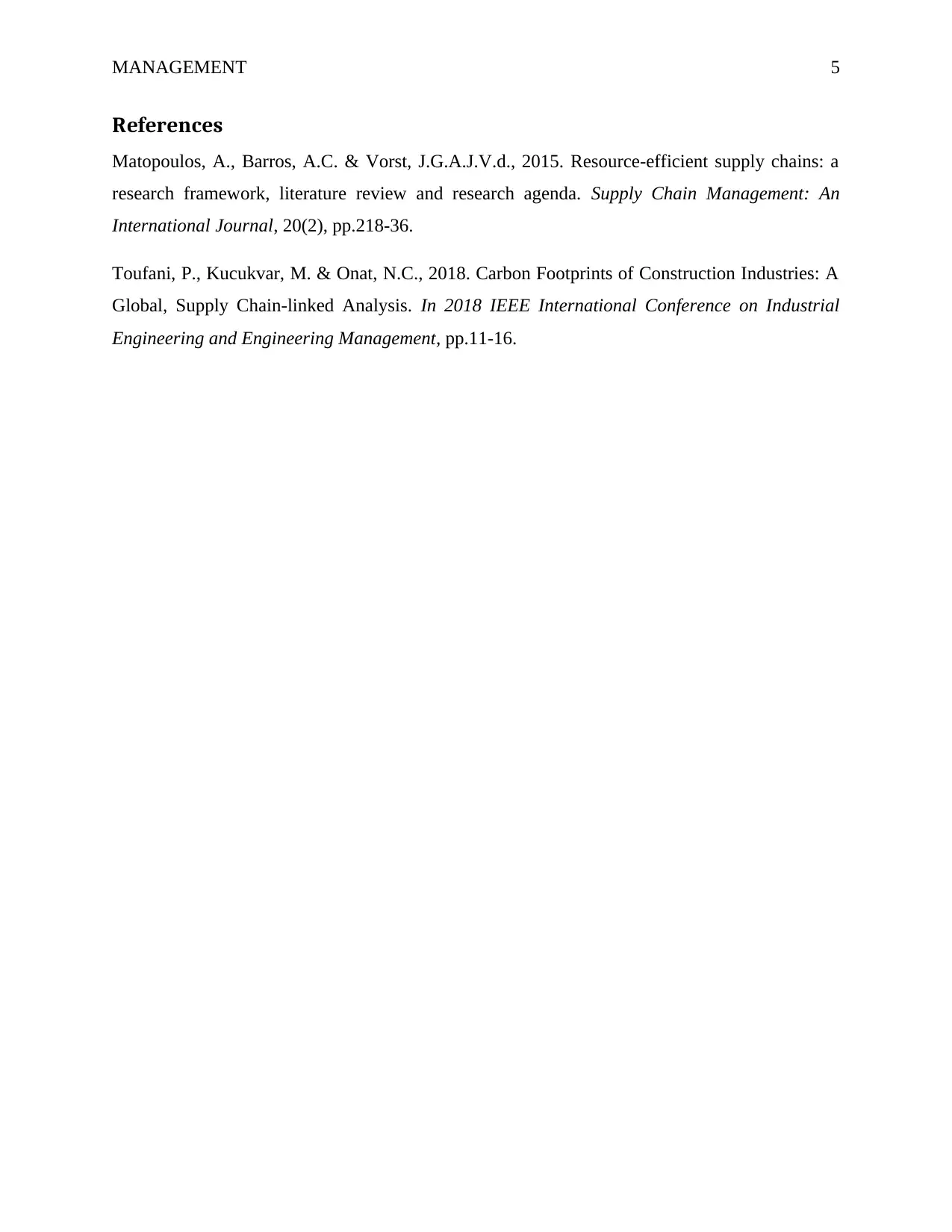
MANAGEMENT 5
References
Matopoulos, A., Barros, A.C. & Vorst, J.G.A.J.V.d., 2015. Resource-efficient supply chains: a
research framework, literature review and research agenda. Supply Chain Management: An
International Journal, 20(2), pp.218-36.
Toufani, P., Kucukvar, M. & Onat, N.C., 2018. Carbon Footprints of Construction Industries: A
Global, Supply Chain-linked Analysis. In 2018 IEEE International Conference on Industrial
Engineering and Engineering Management, pp.11-16.
References
Matopoulos, A., Barros, A.C. & Vorst, J.G.A.J.V.d., 2015. Resource-efficient supply chains: a
research framework, literature review and research agenda. Supply Chain Management: An
International Journal, 20(2), pp.218-36.
Toufani, P., Kucukvar, M. & Onat, N.C., 2018. Carbon Footprints of Construction Industries: A
Global, Supply Chain-linked Analysis. In 2018 IEEE International Conference on Industrial
Engineering and Engineering Management, pp.11-16.
⊘ This is a preview!⊘
Do you want full access?
Subscribe today to unlock all pages.

Trusted by 1+ million students worldwide
1 out of 6
Related Documents
Your All-in-One AI-Powered Toolkit for Academic Success.
+13062052269
info@desklib.com
Available 24*7 on WhatsApp / Email
![[object Object]](/_next/static/media/star-bottom.7253800d.svg)
Unlock your academic potential
Copyright © 2020–2026 A2Z Services. All Rights Reserved. Developed and managed by ZUCOL.





